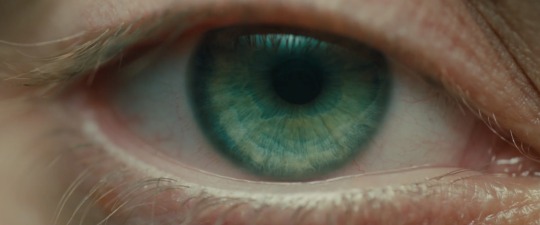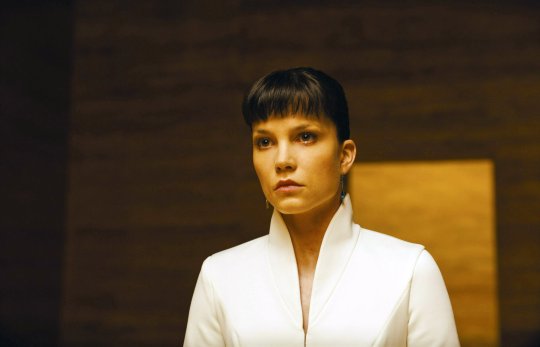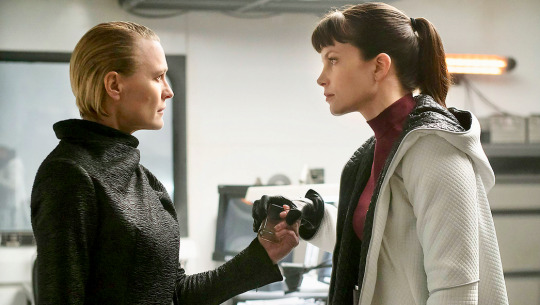#LIGHT AND REVELATION AND SUBVERSION PARALLELS!! MY VISION-
Text

cRinGeTobEr dAy FOURRR: angel x demon
#BIBLICALLY ACCURATE SAIOUMA BE UPON YE#cringetober2023#oumasai#eyestrain#saiouma#maiora draws#get it!! because lucifer means light bringer in latin!!!! and and and#LIGHT AND REVELATION AND SUBVERSION PARALLELS!! MY VISION-#/silly#I've made something that makes me genuinely ill looking at it HAHAHAH massive W!!!#shoutout to my friend for contributing the fingers in the background even though ya cant fucking tell they're there!!! LMAO#don't look for them please spare your eyes#ask to tag#cw religious imagery#shoutout to my religious trauma i am now recycling into cringetober drawing pfft!!
347 notes
·
View notes
Text
My Uncut Love for “Blade Runner: 2049″ Hasn’t Diminished (And Probably Never Will)
It’s been months since Denis (Sicario, Prisoners, Arrival) Villenueve’s sequel to Blade Runner was unveiled to American audiences, and in an unfortunately surprising twist of fate, many of us Yanks didn’t show up to watch it.

As soon as those first exhilarating trailers struck social media, I fully expected Blade Runner 2049 to be the instant cultural phenomenon Ridley Scott’s original film never was - vindicating Blade Runner’s decades-long crawl from cult curio to global ubiquity, and reviving the moviegoing public’s obsession with replicants, spinners, origami, steaming food truck noodles, and Johnnie Walker sipped from those gorgeously sculpted tumblers.

If you’ll indulge me while I do a little bean counting, Blade Runner 2049 cost in the ballpark of $150 million to make. In those first few weeks of release, audiences eventually bought enough tickets to raise the domestic total to $83 million. This disparity lead many to construe Blade Runner 2049 as a box office bomb and all-around disappointment, even though foreign box office handily netted producing partners Warner Bros., Alcon Entertainment, and Columbia Pictures an additional $142 million. I haven’t a doubt that it’ll break even when the dust finally settles.

At the risk of sounding trite, I’ll assert that matters of business and budget have zero to do with Blade Runner 2049′s cinematic merit, no matter what trades like The Hollywood Reporter might suggest. The essence and quality of any movie need only be valued by the sound and picture flickering from within the big bright rectangle. Everything else is just noise.
When the nerd holiday of Blade Runner 2049′s opening weekend finally arrived, I watched it on the best and largest screen I could, joined by a little fellowship of family, friends and coworkers. The verdict?
Few would deny that 2017′s timeline has been a non-stop deluge of terror and portent. Everything from politics and national tragedy after national tragedy to my own personal quagmires had left me craving the escape of Blade Runner’s unmistakable brand of sci-fi super-noir. Villenueve’s lavish sequel couldn’t have come along at a better time.
Once a certain father met his long-lost daughter and the movie cut to black and credits, the lights went up. My party went their separate ways, and I sullenly returned to a life bearing little resemblance to the vivid landscapes in which I had swam for three blissful hours of lucid dreaming.
The best films establish permanent residency in our creative imaginations. We long to inhabit them, even after the theater is empty and the ushers are sweeping stale popcorn away from our feet. 2049 was one such experience for me.

Despite the enormous volume of criticism already generated, I thought I’d offer my detailed take on it anyway.
In an effort to keep this essay wide-ranging and interesting, I’m going to have to spoil much of the narrative. Please watch the movie already, so we can diffuse any risk of ruining the movie’s many delightful surprises...
The advertising campaign for 2049 was brilliant at both enticing hardcore Blade Runner fans with throwbacks to the many things that made that film so iconic and unforgettable, while also giving the curious uninitiated a comprehensive tour of the countless appealing visual and thematic qualities that could be enjoyed separate any primer or context.
Each trailer seamlessly obfuscated practically every aspect of the plot that had the potential to be a narrative surprise - Except, of course, for the presence/return of a grizzled-as-hell Rick Deckard (Harrison Ford).

I was thrilled to discover upon first viewing that Ryan Gosling’s “Officer K” is himself a replicant - a cop working for icy LAPD Lieutenant Joshi (Robin Wright, unsurprisingly perfect) to snuff out certain older model replicants who managed to slip into lives of anonymity before their corporate overseers put out a product recall.
It’s easy to draw parallels between Gosling’s Officer K and today’s American ICE stormtroopers. 2049′s first onscreen replicant (played with gentle grace by human redwood trunk Dave Bautista) is brutally “retired” by Gosling while a pot of garlic boils on a range top nearby. This jolt of an opening scene deftly introduces us to a robot humbly trying to adopt a simple human life, eking out a peaceful existence in solitude, living off the grid as a protein farmer.

Using Gosling’s K as the button man, Bautista’s character Sapper Morton is brutally gunned down by the technical arm of 2049′s despicable government, crystallizing the black-hearted fascism of this future vision of LA. By the end of the sequence, 2049 manages to both brilliantly depart from and add to Ridley Scott’s established world of monolithic corporations and their mutinous android labor force.
As a movie obsessive who has always believed Rutger Hauer’s Roy Batty (the antagonist from the first film) had Blade Runner’s most charismatic screen presence AND emotionally involving story arc, the decision made by Villenueve and Ridley Scott to tell 2049′s story through the eyes of a replicant instead of a human is an inspired one.
Gosling’s Agent K is a Good German whose only extra-professional pastime is the oddly touching Stepford-meets-Siri romance he carries out with “Joi,” a holographic fellow AI. Joi adds compelling new layers to 2049′s preoccupation with the line (if we decide there even is one) separating humans from replicants.
According to blind zillionaire industrialist Niander Wallace (Jared Leto, adding another tic-filled personality to his growing gallery of loathsome weirdos), the continued and assured inability of replicants to conceive children is essential to keeping his legions of android slaves subservient. In the world of 2049, Wallace is a sort of God (or Pharaoh, as his incredible pyramidal fortress seems to signify), and replicants who reproduce of their own free will would be a mortal threat to this Pharaoh’s monopoly on slavery and world expansion.

The ideas surrounding Wallace are articulated in a violent and disturbing scene that completely repelled me upon first viewing (men’s prodigious violence towards women is a subject I’m frankly exhausted to see dramatized during these dark days), in which Leto pontificates about his ambitions while sterilizing a newborn replicant by taking a knife to her uterus.
Wallace has built - and continues to expand - an empire to rival Alexander’s, and that God complex seems to have allowed his absurdly grandiose ego to eclipse any considerations of morality or human compassion. He’s a creep.

As Wallace leaves his chattel bleeding and naked in the same spot she was minutes-ago conceived (presumably to be shuttled to some salt mine or brothel "off-world”), Wallace’s personal secretary Luv (an advanced model replicant played by Sylvia Hoeks), sympathetically regards the brutalized woman from a sentry position nearby, tears streaking across her otherwise stoic, painted face. So much is already happening beneath the surface in this film.
Through Luv, Villenueve continues contrasting human characters with scant empathy and monstrous cruelty with replicant characters who have deep reverence for life’s creation and preservation, be that human life or the lives of other replicants.
Luv's attitudes lie somewhere in the middle of that spectrum. A scene-stealer from minute one, Luv is first introduced as an HR cipher sent forth to meet K as his investigation takes him deeper into the halls of power. When she needs to be, Luv is a polite charmer and the world’s most attentive and fastidious secretary, but she can also be an asset when a coroner's head needs to be squashed like a melon, or when the chief of police requires violent interrogation at knifepoint or with shattered glass.
Luv’s finest moment of effortless aggression might just be her casual drone-bombing of a junkyard Gosling’s K investigates during a crucial sequence - she has a manicurist do her nails on one hand while she fires a volley of mortars via iPad with the other.

The crux of the film is the gradual unveiling of K’s identity, followed by an interesting subversion of what I initially assumed was a fairly predictable twist. K’s chief assignment is to kill the hidden offspring of Rachael (the replicant played by Sean Young in Blade Runner) and the long-absent Rick Deckard (Ford).
K finally deduces that he may very well be Deckard’s son, which throws his entire code of ethics and sense of purpose into disarray. He goes on the lam from his oppressive LAPD handlers to find Deckard and determine whether this whole “being half human with actual, non-implanted memories” bombshell revelation has genuine merit.

There are several amusing scenes seeded throughout the movie in which Officer K has to take a psychological evaluation or “baseline test” (conducted by an asshole robot, of course). In the early part of the film, K suffers zero identity crisis, so he passes the test with flying colors. But as his case begins to unravel the assumptions he had long held about himself and the system he serves, K’s answers to the robot’s questions become more erratic and threatening to his handlers.
A transcript of the first test might be worth printing verbatim here...
Interrogator: "Recite your baseline."
K: "And blood-black nothingness began to spin... A system of cells interlinked within cells interlinked within cells interlinked within one stem... And dreadfully distinct against the dark, a tall white fountain played."
Interrogator: "Cells."
K: "Cells."
Interrogator: "Have you ever been in an institution? Cells."
K: "Cells."
Interrogator: "Do they keep you in a cell? Cells."
K: "Cells."
Interrogator: "When you're not performing your duties do they keep you in a little box? Cells."
K: "Cells."
Interrogator: "Interlinked."
K: "Interlinked."
Interrogator: "What's it like to hold the hand of someone you love? Interlinked."
K: "Interlinked."
Interrogator: "Did they teach you how to feel finger to finger? Interlinked."
K: "Interlinked."
Interrogator: "Do you long for having your heart interlinked? Interlinked."
K: "Interlinked."
Interrogator: "Do you dream about being interlinked... ?"
K: "Interlinked."
Interrogator: "What's it like to hold your child in your arms? Interlinked."
K: "Interlinked."
Interrogator: "Do you feel that there's a part of you that's missing? Interlinked."
K: "Interlinked."
Interrogator: "Within cells interlinked."
K: "Within cells interlinked."
Interrogator: "Why don't you say that three times: Within cells interlinked."
K: "Within cells interlinked. Within cells interlinked. Within cells interlinked."
Interrogator: "We're done... Constant K, you can pick up your bonus.”
- -
Such is the cross the obedient replicants of 2049 need to bear.
The movie is long and weighty, but never a chore to watch or difficult to follow. If memory serves, top-billed Harrison Ford (as iconic replicant killer Rick Deckard) doesn’t even appear onscreen until two hours in, but his applause-worthy arrival enhances the movie without drawing any interest away from Officer K. Once Gosling’s investigation brings him to the doorstep of Deckard’s booby-trapped casino hideaway (itself contained in a stunningly radioactive, vacant and dust-caked future vision of Las Vegas), the movie’s costars initially face off as adversaries before finally forming an uneasy partnership to speak truth to power, and - on a more human level - reunite Deckard with his long-lost progeny.
I suppose it’s in this last stretch of the film that director Denis Villenueve’s soul bares itself in a way that distinguishes this new film from its famous predecessor. Instead of culminating in any kind of epic conflict affecting global change, or placing the replicant vs. tycoon class war center stage, the movie narrows its focus on what Gosling chooses to do as he contemplates whether he is human or not, and what the distinction really means to him.
The finale’s centerpiece is a vicious physical contest between replicants K and Luv on the shores of future LA’s “Sepulveda Wall,” where a spinner/prison transport vehicle has crash landed and sinks gradually into an onslaught of crashing waves. As the warriors clash nearby, a handcuffed Deckard watches patiently and waits for what could just as easily be his demise rather than his salvation.
By rescuing Deckard from certain death, K liberates himself from his previously programmed destiny, as well as any selfish baggage we can agree is very key to the human condition. Lying in the snow, bleeding out in 2049′s poignant final moments, K finds peace in having healed the only part of the world he could.
I couldn’t end a review like this without tipping my hat to the genius DP Roger Deakins, who I would insist is as much an author of 2049 as Villenueve or Ridley Scott. It was wise to select a cinematographer whose visual ambition matches the subject and content of a movie so epic and complex, and the result - hyperbole be damned - is one of the most gorgeous movies I’ve ever seen.
In a movie designed from the ground up to convincingly plunge us into an endless procession of jaw-droppingly unique and visually stunning environments, Deakins never fails to precisely, carefully discover inspired new ways of capturing the work of his similarly gifted production designers, costumers and effects artists. If there’s one aspect of 2049 that would be obvious to anybody from frame one, it’s the confident belief that the visual experience of the movie ahead is going to be unmatched and unprecedented.
“Blockbusters,” which I suppose describe any kind of film made with a large budget, featuring movie stars and wielding all of the trappings necessary for worldwide distribution, can be a tiresome proposition for those of us that consume movies frequently and ask a little more from the cinema experience than some of our less-discerning peers.
Blade Runner: 2049 accomplishes everything movies of this scale and pedigree tend to attempt, does so with perfection, and then reaches for (and attains) even higher levels of technical, narrative, and performance ambition. This truly is a tentpole Harrison Ford action movie that is also without question an “art film,” entertaining from the surface to the core, and dense with subtext, intriguingly unanswered questions and hauntingly iconic images. It will stand the test of time as all great movies do, and impressively earns its proud place alongside the revered sci-fi film that inspired it.
youtube
0 notes